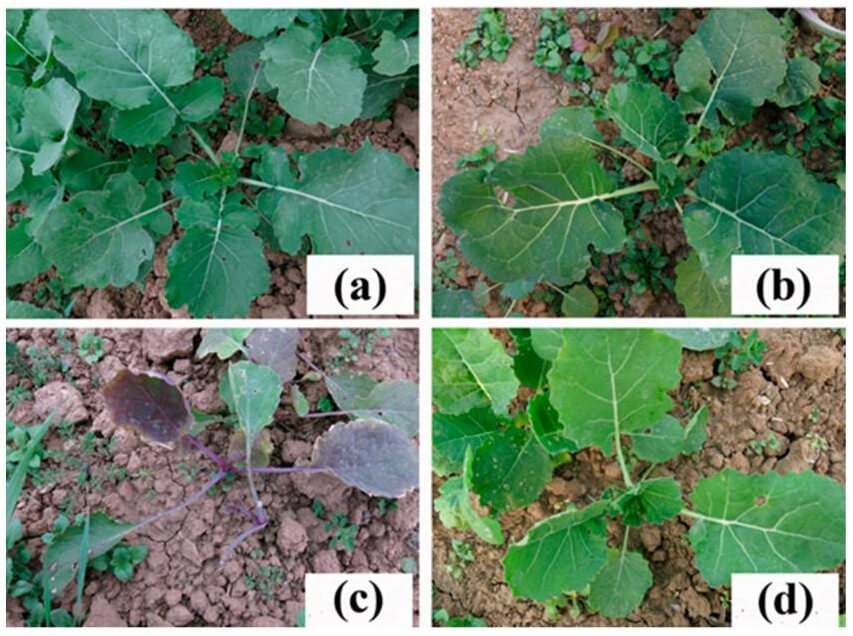Rapeseed (Brassica napus L.) is a vital oil crop globally. High-oleic acid rapeseed oil has the advantages of reducing cardiovascular disease and cholesterol content, being easy to store, having a long shelf life, not easily oxidized, and providing nutritional health care. Because its quality is comparable to high-grade edible vegetable oils such as olive oil and camellia oil, its planting time is relatively short, and it is easy to survive; it has always been favored by people, and research on high-oleic acid rape is receiving more and more attention. In addition, with the rapid expansion of mechanized production of rapeseed, weed control has become a challenge faced by rapeseed fields. Genetically modified rapeseed is a rapeseed crop that uses modern molecular biology techniques and methods to modify the rapeseed genome to obtain herbicide resistance, high oleic acid, and other traits. However, genetically modified rapeseed will produce unexpected genomic changes during the research and development process, causing expression changes of non-target genes and unexpected phenotypic changes. Genetically modified rapeseed needs to undergo a long-term, comprehensive, and systematic safety evaluation from research and development to enter the market, evaluated from three major aspects: molecular characteristics and genetic stability, environmental safety, and food safety.
 Fig. 1. Resistance of the rapeseed mutant line K5 to tribenuron-methyl (TBM). (Huang et al., 2020)
Fig. 1. Resistance of the rapeseed mutant line K5 to tribenuron-methyl (TBM). (Huang et al., 2020)

We provide advanced plant genetic engineering services to improve rapeseed genetic traits by applying gene gun, pollen pipeline, Agrobacterium-mediated methods, etc. We can help you develop genetically modified rapeseeds that are disease-esistance, insect-resistance, herbicide-resistance, salt-tolerance, cold-tolerance, canola oil yield, seed size, and many other traits. With years of experience, Lifeasible provides professional rapeseed molecular characterization analysis services to evaluate the safety of genetically modified rapeseeds. We ensure to provide you with comprehensive molecular characterization information of genetically modified rapeseed, rapeseed oil, and rapeseed meal, including genomic integration sites of foreign sequences, copy numbers, and flanking sequences.
We have a complete genetically modified rapeseed molecular characterization detection system, including Southern hybridization, polymerase chain reaction (PCR) analysis, PCR-based genome walking, high-throughput sequencing technology, etc. Based on your project requirements, we will choose the best detection method for you to analyze the molecular characterization of genetically modified rapeseed. We can analyze the following genetically modified rapeseeds, including but not limited to:
| AHAS 1 | AHAS 2 | AHAS 3 | AHAS 4 |
| AHAS 5 | Fad2 | BnGPAT6 | ALS |
| BnPAP17 | BnaM154 | AT114 | AT148 |
We provide the most basic PCR to determine whether the target gene can be transferred into rapeseed crops. We need to provide the sequence information of the detection primers, the conditions of the PCR reaction, and the band size of the amplified target gene.
In addition, we provide southern-blot experiments to determine how many copies of foreign genes have been transferred. Generate data such as the name of the endonuclease that digests the genome and the size of the specific band.
We provide tail-PCR or genome-walking experiments to obtain the boundary sequence of the insertion site and determine where in the genome it is inserted through PCR. Generate data such as boundary sequence information (greater than 300bp) and amplification primer sequence information.
We provide RNA and protein level data of exogenous genes to analyze the expression of exogenous genes. RNA detection can be performed through two experiments, RT-PCR and northern-blot. Protein level detection can be carried out through two experiments, ELISA and western blot.
Lifeasible is committed to analyzing the integration of the target gene in the genome of genetically modified rapeseed and analyzing the stability of the target gene integration through whole-gene resequencing results. We aim to provide technical support for genetically modified rapeseed in the subsequent stages of genetically modified safety evaluation. Please contact us for the best analysis solutions for genetically modified rapeseed molecular characterization.
Reference